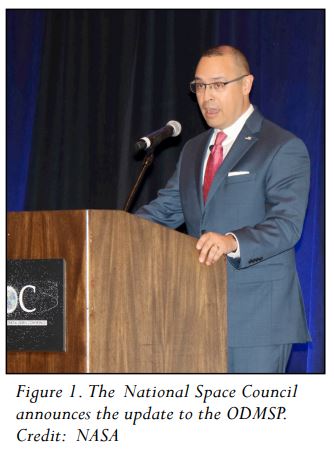This article originally appeared in Orbital Debris Quarterly News, Volume 24, Issue 1, February 2020.
The inaugural International Orbital Debris Conference (IOC) was held 9-12 December 2019, in Sugar Land, Texas. This event also corresponded with the 40th anniversary of the NASA Orbital Debris Program Office (ODPO) being established at NASA Johnson Space Center (JSC) in 1979.
The goal of the IOC is to promote orbital debris research activities in the United States and to foster collaborations with the international community. The first IOC attracted 288 registered participants from 21 countries. 
The IOC opening keynote was presented by Col. Curtis Hernandez, Director of the National Security Space Policy from the U.S. National Space Council (Figure 1). Col. Hernandez delivered the address “Driving Adaptive and Responsive Orbital Debris Policies.” He endorsed the efforts of NASA on leading the update to the U. S. Government Orbital Debris Mitigation Standard Practices (ODMSP), as directed by Space Policy Directive-3 (SPD-3), and officially announced the ODMSP update as approved and available on the ODPO website.
Originally published in 2001, this 2019 update to the ODMSP includes improvements to the original objectives as well as clarification and additional standard practices for certain classes of space operations. It provides a reference to promote efficient and effective space safety practices for domestic and international operators.
Two additional keynote addresses were given by Mr. Don Kessler, former NASA Senior Scientist for Orbital Debris, and by Professor Heiner Klinkrad of the Technical University of Braunschweig, former head of the European Space Agency (ESA) Space Debris Office. Both speakers provided a history of space debris programs at NASA and ESA, respectively. After the opening plenary (shown in Figure 2), the IOC was conducted in two parallel oral sessions and two dedicated poster sessions over a 4-day period.
A total of 162 technical papers were presented during the sessions. They covered optical, radar, laboratory and in-situ measurements, modeling, reentry, hypervelocity impacts, protection, satellite anomalies, conjunction assessments, mitigation, remediation, space situational awareness, space traffic management, policy, and meteoroids. The papers are available individually or may be downloaded as a group at https:// www.hou.usra.edu/meetings/orbitaldebris2019/presenter/.
Excellent participation from the global orbital debris community, distinguished keynote speakers, contributions from the Technical Program Committee members, session chairs, and the Local Organizing Committee members, and the support of the Universities Space Research Association/ Lunar and Planetary Institute made the first IOC a very successful event.
